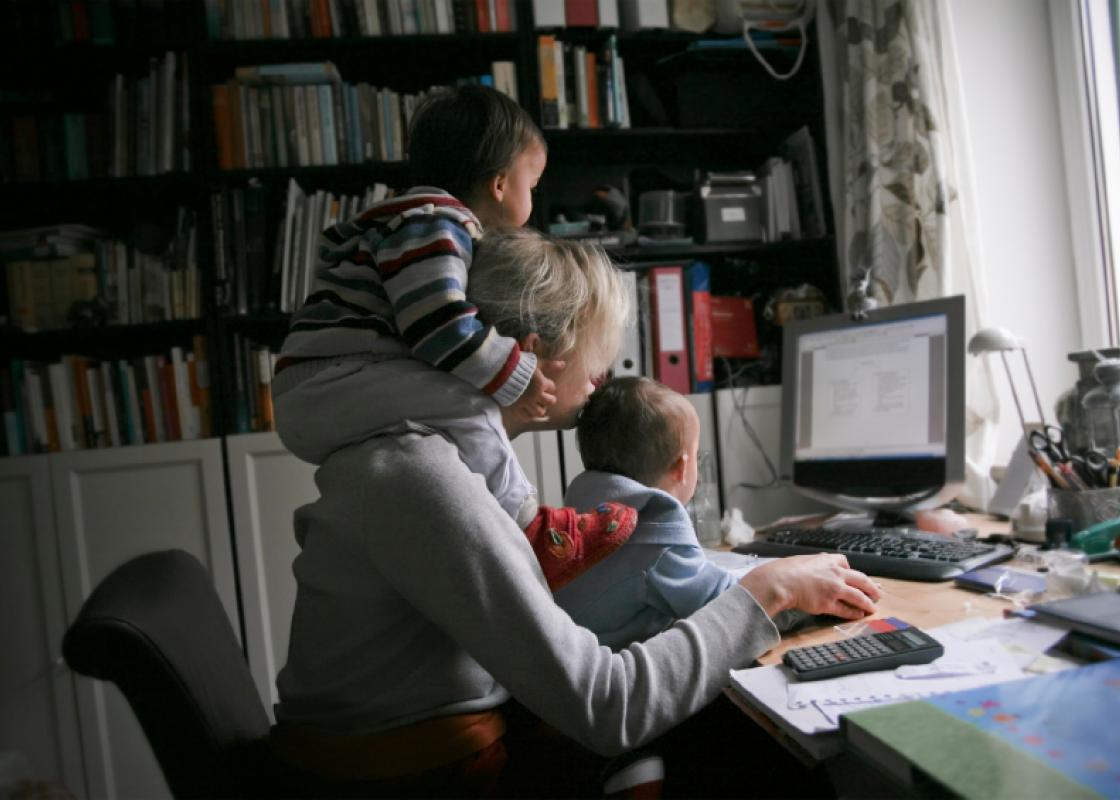A woman reduces her position to 60 percent in order to spend more time with her children. To avoid feeling uncomfortable about the problems this creates for her employer and colleagues, she asks for only 50 percent salary. Naturally her boss agrees.
This is one way the time crunch can be solved in Great Britain. A Norwegian mother would never accept less than full pay for all the hours she works, even though she works part-time.
This story is told by Sevil Sümer, a sociologist and associate professor who has studied the work-life balance in several European countries. Sümer has recently published a book that explores the research conducted on gender equality efforts within the EU and in the Scandinavian countries. After completing her master’s degree in her home country of Turkey, she moved to Norway and completed her doctoral degree here. She now spends half the year in Norway and the other half in Turkey, and has a great deal of experience discussing Scandinavian welfare schemes with her colleagues farther south.
Not about money
“I often run into the attitude that the situation in the Mediterranean countries cannot be compared with the ‘rich’ Scandinavian countries. Southern Europeans think that they cannot afford welfare schemes such as one year of parental leave or child care for everyone, or that the government has a responsibility for elderly care. But this issue is not about money, it is about attitudes and priorities,” she says with conviction.
The money is available, she believes. It is just a matter of the government changing its priorities regarding how the money will be used. This is where attitudes come into play.
“There is an attitude throughout much of Europe that the government should not get involved in family life. When I tell my southern European colleagues that child care was a major issue in the Norwegian election, they are quite surprised. They attribute this to a huge cultural difference,” Sümer explains.
But the sociologist does not accept this explanation either.
“It is not a matter of culture. It has to do with attitudes that can be changed through political decisions. We see this in the daddy quota in the Norwegian system for parental leave. Previously most fathers took very little leave even though the right could be used by both parents, but when a specific quota was introduced, a large percentage of fathers quickly took advantage of it,” she says. Consequently, she believes that quotas are vital for bringing about structural changes in the area of gender equality.
“It is important that society does not view children as the parents’ private problem, but that public policy reflects society’s overall responsibility for children,” Sümer believes.
She gained insight into EU policy in this area when she participated in the research project entitled Transitions: Gender, Parenthood and the Changing European Workplace in 2003-2005. In her new book European Gender Regimes and Policies, she reviews a large body of research on European schemes for parenthood as well as the results from the “Transitions” project.
Limited knowledge about rights within the EU
Not all decisions taken by the EU are binding for the member states, and the regulations concerning the work-life balance have usually not been binding from a historical perspective. But in 1996, the EU issued a directive requiring the member states to give three months of parental leave to employees following the birth of a child. This right is not linked to gender and may be divided between the parents if they wish.

However, employers are not required to pay wages to employees when they take parental leave. The researcher also discovered in the “Transitions” projects that many EU citizens are unaware of their rights, and if they are aware, they are still not certain they can take advantage of them. Managers may resist granting leave or finding other solutions that make daily life easier for parents with small children – or the employees’ own conscience stops them from demanding their rights.
Knowledge about rights is also linked to economic class.
“In Portugal we saw that employees in lower-class jobs were not aware of their right to take parental leave or they did not dare to demand their rights because they were afraid of losing their jobs. There were many more employees in middle-class jobs who took parental leave,” says Sümer.
Inspiration source for the EU
“The EU views Scandinavia as a context of "good practices" regarding work-family reconciliation policies. This is largely because Scandinavia has maintained its birth rate better than the rest of Europe, while women have performed paid work at the same time. The fact that Finland and Sweden have joined the EU has also had an impact because, among other things, women from these countries hold key positions within the EU system,” says the researcher.
Some feminists have criticized the EU for being a neo-liberal institution whose sole motivation for ensuring that women are able to perform paid work is economic gain.
“This is an important criticism, but compared with the USA I believe we see that social inclusion is a crucial aspect of the EU’s gender equality policy. The EU is large and has lots of different opinions, but many are genuinely concerned that the gender perspective is not just words on a piece of paper,” says Sümer, and continues:
“Because women are needed in the workplace, the division of work within the family becomes a public matter since unpaid care-giving and housekeeping duties prevent women from working outside the home for pay.”
Another critique directed at the EU by some feminists is that gender-neutral legislation serves to maintain patterns of gender roles since it is women who make use of flexible solutions in their working life.
“This is related to the difficult topic of gender mainstreaming, in which the gender perspective is integrated into all levels and areas of the public and private sectors instead of talking about women’s rights in particular. In many countries we see that when responsibility for gender equality is distributed across several ministries, gender equality efforts as a whole end up being weakened,” Sümer points out.
In the future Sümer plans to investigate the implications of gender mainstreaming, as well as of intersectionality (a theoretical model developed to improve the ability to analyse how various forms of oppression interact and affect the same person or group) in her position as coordinator of the EU-funded FEMCIT project.
Nonetheless, Sümer is cautiously optimistic about the EU’s ability to pull the rest of Europe in the direction of the Scandinavian welfare schemes.
“Change is occurring, and it is important that things are put down on paper. Many of my European and Turkish colleagues are pleased with the changes being made through the EU system.”
Translated by Connie Stultz
Sevil Sümer is a senior researcher at the Stein Rokkan Centre for Social Studies in Bergen and coordinator for the EU-funded FEMCIT project. She received her bachelor’s degree in business administration in Turkey, and then moved to Norway and completed a master’s degree in sociology at the University of Bergen in 1996. In 2002, she completed a doctoral degree at the same university. She recently published the book European gender regimes and policies (Ashgate 2009).
Aktuelle lenker
In her book, Sümer categorizes European countries on the basis of their attitude towards the balance between work and family life.
Non-interventionist:
The attitude in these countries is that as a general rule, the government should not intervene in family life. Women are welcome in the workplace, but problems that arise when they have children must be solved on a private basis. Great Britain is an example of this.
Familialistic:
These are countries that want to maintain a more traditional family structure and have not developed any family policy. Traditionally this has applied to the Mediterranean countries, but there have been many changes in recent years, according to Sümer.
Defamilalizing:
The government provides assistance with child care and care for the elderly, not by assuming 100 percent responsibility but by establishing institutions that can help. In these countries, the balance between work and family life is viewed as a public matter. This is most fully developed in the Scandinavian countries.
Transitions
The multinational research project entitled “Transitions: Gender, Parenthood and the Changing European Workplace” studied how young adults in Europe balance parenthood and work. The project has resulted in the publication of the book Work, Families and Organisations in Transition, Lewis et al. (eds.), Policy 2009.
The FEMCIT project
FEMCIT Gendered Citizenship in Multicultural Europe: The Impact of Contemporary Women's Movements
This project has been funded by the EU Sixth Framework Programme for the period 1 February 2007 to 31 January 2011.
